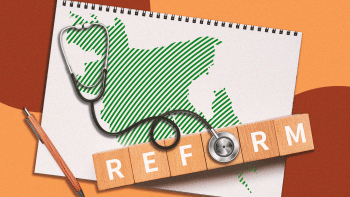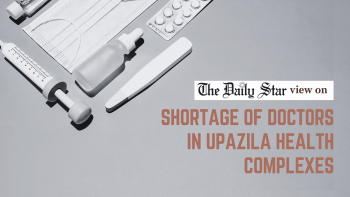The health sector needs a complete overhaul

Our health sector has long been plagued by corruption, inefficiency, and a lack of accountability and good governance. Over the past decades, while healthcare costs have significantly increased, the quality of services has not improved as expected. The lack of adequate healthcare facilities across the country has been a persistent problem, while the absence of healthcare professionals at upazila and union-level facilities has deprived rural and marginalised populations of even basic services. Against this backdrop, the Health Sector Reform Commission's proposals give us hope for building a system that will be efficient, people-oriented, and accessible to all.
Unfortunately, public health has never been a top priority for successive governments. While sectors such as public administration, energy, transport and communication, local government and rural development, and defence, among others, have received significant budgetary allocations, the health sector has been comparatively neglected. Therefore, the commission's suggestion that our total public health expenditure should rise to around 15 percent of the total budget, or at least 5 percent of GDP, is appreciable. Reportedly, countries making significant progress in achieving universal health coverage globally spend 5 percent or more of their GDP on healthcare. Greater investment is thus crucial, as it will expand healthcare services, reduce out-of-pocket expenses, and ensure financial protection for ordinary citizens.
The commission also recommends that the authorities make primary healthcare a constitutional obligation, providing it free of cost to all. It also recommends strengthening the primary healthcare system by integrating union-level health and family planning centres into fully functional primary healthcare centres. In urban areas, such centres should be managed at the ward level. We believe these reforms are crucial to ensure universal access to primary healthcare. Forming an independent Bangladesh Health Commission to ensure a transparent and effective health system is another important recommendation. Additionally, creating an autonomous Bangladesh Health Service by restructuring the current health cadre to enhance professionalism, skills, and accountability, and establishing a dedicated Public Service Commission for healthcare recruitment are steps whose time has come.
Other major proposals include forming a National Institute of Women's Health, establishing 11 regional health authorities at the divisional level to decentralise healthcare management, integrating multiple government agencies under the Directorate General of Health Services (DGHS), and setting up a pharmacy network to distribute essential medicines either free or at subsidised rates. Additionally, prohibiting pharmaceutical companies from influencing doctors through gifts or free samples, and encouraging doctors to prescribe medicines using their generic names, seem like well-thought-out suggestions.
That said, while the recommendations made by the commission are crucial, implementing them will undoubtedly be challenging, especially under an elected political government. We hope the interim government will help overcome these challenges with the support of political parties and work sincerely to achieve the goals set by the commission.


 For all latest news, follow The Daily Star's Google News channel.
For all latest news, follow The Daily Star's Google News channel. 











Comments